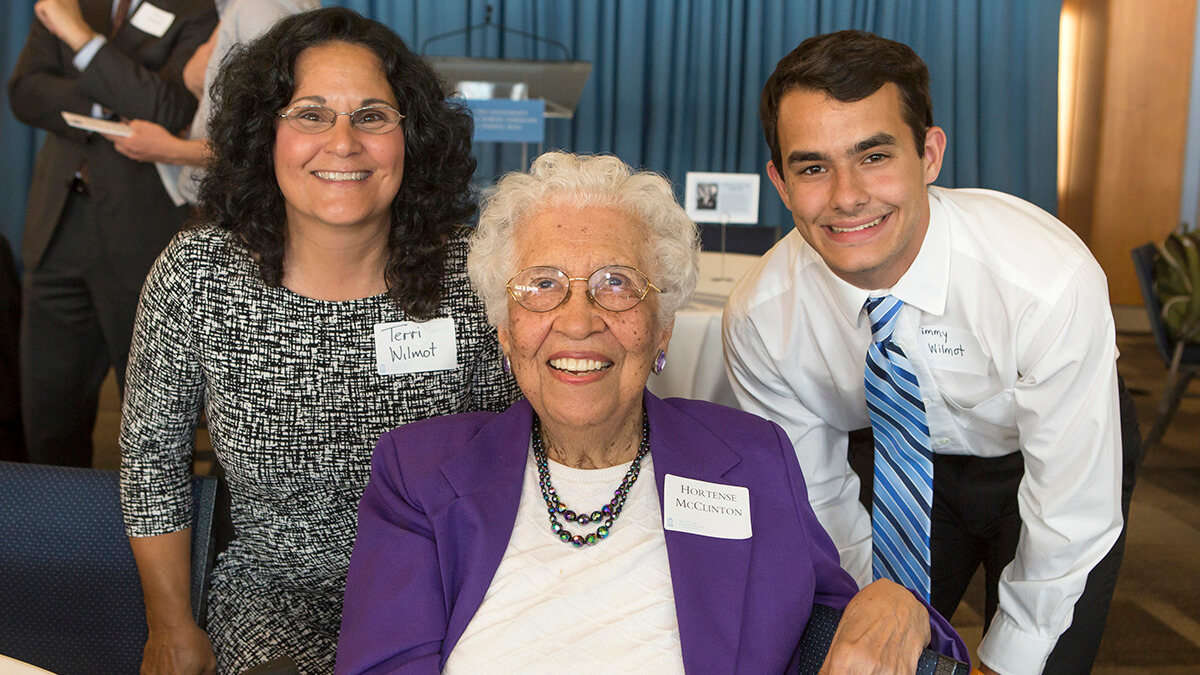Connecting with history
Student-recipients of “noteworthy firsts" scholarships met the important “firsts” in the University’s history that their scholarships are named after.

When first-year Carolina student Kirstin McGinty learned that she would be the first recipient of the Karen L. Parker scholarship, she never expected to shake the hand of the woman her scholarship is named after. More than a half century separate McGinty and Parker, who was the first black woman to attend UNC-Chapel Hill.
But last week at a campus reception honoring Parker and others, the current first-year student had the opportunity to do just that.
“It was really awesome to actually meet with her in person and hear a little of her story,” McGinty said. “It’s pretty surreal. Whenever you hear about history you never really have a chance to interact with it, but this opportunity helps connect you in a way that you wouldn’t otherwise have been able to.”
The reception held at the Blue Zone at Kenan Stadium celebrated the renaming of Carolina scholarships to honor the courageous Tar Heels who represent important “firsts” in the University’s history.
At last year’s University Day celebration, Chancellor Carol L. Folt and Vice Provost for Enrollment and Undergraduate Admissions Stephen Farmer announced that existing need-based undergraduate grants and fellowships would be renamed to recognize 21 key figures in Carolina history. Among those former students are people like Parker; Sallie Walker Stockard, who became the first woman to graduate from Carolina in 1898; Henry Owl, the first American Indian to study at Carolina in the 1920s; and Charles Scott, the University’s first black scholarship athlete.
“Where we are today is a direct result of who they are, what they stood for, and the way in which they conducted their own lives,” Folt said. “We see you all as UNC heroes.”
The 90-minute reception also served as an opportunity for the scholarship recipients to meet some of the honorees who have helped the University became what it is today.
“As we learned about you and your family members, as we came to understand fully the difference you made in making this place what it can be, as we became more and more inspired by the hard work and struggle and by the achievements and joys, we dreamed of a moment where we could be together,” Farmer said of the honorees.
During the event, several of the “noteworthy firsts,” including Parker; Hortense McClinton, Carolina’s first black professor; Ralph Frasier, one of the first three black men to attend the University; Santiago Gangotena, who received his Ph.D. in physics from Carolina and went on to found Universidad de San Francisco de Quito in Ecuador; and Patricia Dallas Horoho, the first female surgeon general of the Army, shared their stories and offered advice to the students.
Those stories, Folt said, can still be a source of inspiration to today’s students.
“We often think about how the University has changed over time and how it still has many changes ahead, but every person in this room, and everyone here to celebrate, is mindful how change takes place,” Folt said. “Change takes place by the individual steps of individual people.”




